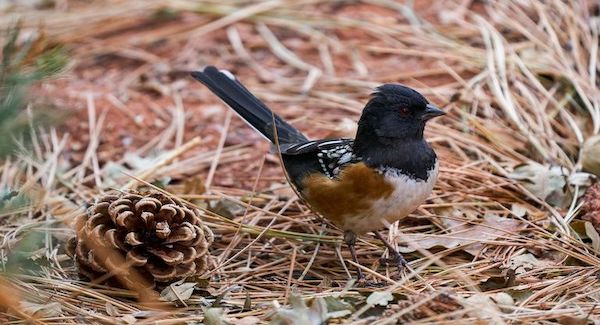
Spotted towhees were recorded for the study's bird chorus. MichaelSchmitz / Getty Images
Are Birds the Reason You Feel Good in Nature?
MARY JO DILONARDO
There have been many studies that show being in nature is good for your health. Walking in the woods boosts your well-being . Living near trees can help you live longer . Being around water can improve your mood .
But when you go for a walk in the woods, what is it particularly about being in nature or being outdoors that makes you feel good? Is it the sights or smells or sounds? A new study finds it might have something to do with the birds you hear while you stroll.
Researchers from California Polytechnic State University analyzed how much the natural sounds people hear when their outdoors affect well-being. They found that the “phantom chorus” of birds singing increased well-being in protected natural areas. The study was published in Proceedings of the Royal Society B.
For the study, researchers placed 10 hidden, evenly spaced speakers on two sections of trails in the Boulder Open Space and Mountain Parks in Colorado. They played recorded songs from 11 species of birds including American robins, house finches, and black-capped chickadees.
The speakers were placed in realistic microhabitats for each species in order to be authentic. For example, the speaker broadcasting the song of the spotted towhee was placed near the ground in shrubs where the bird is most often found.
The researchers alternated playing the birdsong for a few hours a day for a week, and then turned off the speakers for a week at a time. They interviewed hikers after they passed through the sections with the speakers.
“The main result is that hikers that heard the birdsong responded to questions that indicated a higher current level of well-being relative to those that did not hear the birdsong,” Cal Poly biology Professor Clinton Francis, who led the research, tells Treehugger.
Hikers who heard more birdsong on the first part of the trail said they felt better. Those who heard more birdsong on the second section reported that they thought more birds lived along that part of the trail. Researchers discovered that this perception of more birds contributed to making the hikers feel better.
“With the phantom chorus, we were able to demonstrate that natural sounds have a measurable effect on the quality of hikers' experiences on the trail. That is, hearing nature seems to be important,” says Francis, who is spending the 2020-2021 academic year as the Alexander von Humboldt Research Fellow at the Max Planck Institute for Ornithology in Seewiesen, Germany.
“While the bigger picture of nature's restorative properties is likely to be more complex and involve multiple sensory modalities, our study is the first to experimentally manipulate a single one (sound) in the field and demonstrate its importance to human experiences in nature,” Francis says. “Furthermore, our results underscore the need for park managers to reduce anthropogenic noise pollution, which is not only a cost-effective way to improve visitors' experiences, but can also benefit wildlife as well.”
How Nature Benefits People
Francis points out that the findings can be used in several ways to increase human well-being and the conservation of nature.
“I believe that conservation and biodiversity preservation can improve by demonstrating how nature benefits people. The psychological ecosystem services that nature provides is an important way that people benefit from nature,” he says.
“So far, understanding these benefits has been harder because it is difficult to put a dollar amount on psychological ecosystem services compared to ecosystem services like percent carbon sequestered or boosts to fruit tree pollination. Finally, it is also important for individuals to hear how nature experiences can improve their own lives — carving out time each week to be in nature can have a strong and positive influence on people’s outlook on life.”
